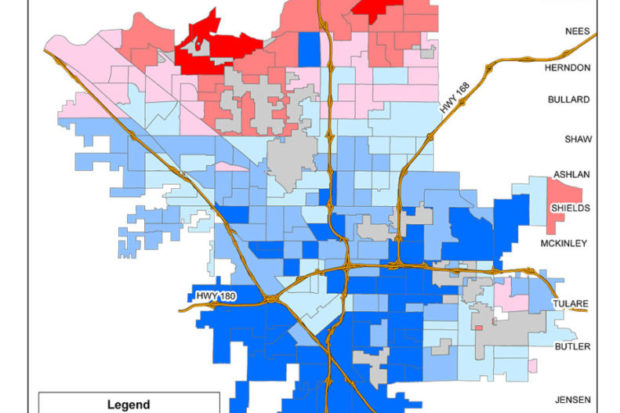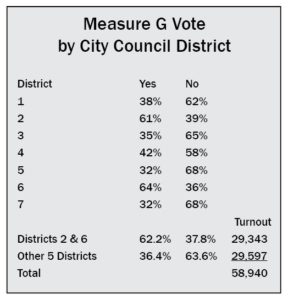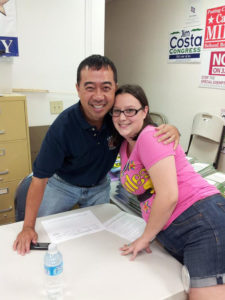
By Michael D. Evans
“Ours was a unique coalition—Republicans, Democrats, business and labor—all working for a better Fresno. We hope to keep that spirit alive.”—Randy Ghan

The City of Fresno’s Measure G referendum is now behind us—at least the election, if not the consequences. Measure G was defeated by a thin margin of 862 votes, but the positive implications of the defeat for the future of our city are significant.
“I feel great about the outcome of the referendum,” said Marina Magdaleno, business director of the International Union of Operating Engineers (IUOE), Local 39. “The residents voted and rejected what the mayor was offering.”
By most appearances, the effort to privatize residential waste service began in the fall of 2012. But it really started much earlier, when commercial waste service was privatized and hollow promises were made that the residential waste service would not be next up for privatization. With the city’s continuing fiscal woes, Mayor Ashley Swearengin made the calculation that she could balance the city’s budget on the backs of residential waste workers and their families.
The mayor tried to push through privatization in the waning days of the 2012 City Council, on which she had a solid 4-3 majority in her favor. The motion to privatize residential waste service was approved on Dec. 20, which had the added benefit for the mayor of putting the start of the 30-day period for challenging the decision during the Christmas and New Year’s holidays.
However, a coalition had earlier come together to challenge the mayor’s initiative. A steering committee consisting of community leaders—Ghan, secretary-treasurer of the Fresno-Madera-Tulare-Kings Central Labor Council; Dillon Savory, political coordinator of the Central Labor Council; Matt Rogers, political director of SEIU 1000; and Michael Evans, chair of the Fresno County Democratic Party—and the heads of the two unions to be most affected by the privatization initiative, Magdaleno and Dee Barnes, president of the Fresno City Employees Association (FCEA), began meeting to coordinate strategies to challenge the mayor’s privatization play.
 Once the City Council decided to privatize the residential waste service and given the timing to collect the roughly 22,000 signatures needed to force a vote to rescind the vote or enable a referendum, the steering committee was not optimistic about the likelihood of success. Then something amazing happened. People from throughout the community came forward to help gather signatures. Yes, there was also a paid element, but it was the community support that put the effort over the top. Almost 40,000 signatures were gathered in about three weeks, and 27,589 of those signatures were determined to be valid—far surpassing the number needed to force the City Council to revisit its decision.
Once the City Council decided to privatize the residential waste service and given the timing to collect the roughly 22,000 signatures needed to force a vote to rescind the vote or enable a referendum, the steering committee was not optimistic about the likelihood of success. Then something amazing happened. People from throughout the community came forward to help gather signatures. Yes, there was also a paid element, but it was the community support that put the effort over the top. Almost 40,000 signatures were gathered in about three weeks, and 27,589 of those signatures were determined to be valid—far surpassing the number needed to force the City Council to revisit its decision.
Meanwhile, the membership of the City Council changed. Andreas Borgeas and Larry Westerlund, both supporters of privatization, were replaced by Steve Brandau and Paul Caprioglio, respectively. Brandau, a Tea Party activist, was known to support privatization, but Caprioglio remained tightlipped about his position. What the public did not know at the time, but the mayor apparently did, was that she could count on Caprioglio’s support.

The City Council opted not to rescind, thereby putting the measure to a referendum. For a city experiencing a severe fiscal crisis, the roughly three-quarters of a million dollars that the special election was projected to cost seemed grossly irresponsible. Furthermore, there was apparently little effort to have the special election for State Senate District 16 due to the resignation of Michael Rubio held at the same time, which would have provided some cost saving. A separate date, however, served the mayor’s purpose in that it would almost certainly keep turnout low.
The referendum was designated “Measure G.” A “Yes” vote on Measure G would privatize the city’s residential waste service; a “No” vote would stop privatization. Both sides began strategizing for victory.
Members of the steering committee that had initially opposed privatization and kicked off the signature-gathering drive started Taxpayers for Good Government, which coordinated the No on Measure G campaign. A Sacramento-based political consultant, Phil Giarrizzo, was engaged, and Savory was named the campaign manager. Fund-raising began in earnest in anticipation of an unlimited spigot of cash from the other side.
A No on Measure G coalition came together quickly. The three City Council members who opposed privatization, Blong Xiong, Oliver Baines and Sal Quintero, were visible supporters. Two high-profile Republicans, Susan Anderson and Doug Vagim, both retired from the Board of Supervisors, became key spokespersons for the campaign. Vagim is also a member of the San Joaquin Valley Taxpayers Association. Former Fresno City Council Member and California Advocate Publisher Les Kimber took on the effort as a personal mission. Frank Balikian, Jr., retired City of Fresno accountant/auditor, raised serious concerns about the scheme. And Susan Good, a small business owner, was a significant participant in the effort.
In addition, business leaders such as John Hernandez of the Central California Hispanic Chamber of Commerce and Tal Cloud opposed Measure G although their efforts were independent of the organized campaign.
The result was a patchwork of community interests that established the grassroots effort necessary to defeat the ample resources of the Yes on Measure G campaign. And did the community ever step up. Joshua Salinas, office manager of the Democratic Party Headquarters, noted that “the demand for No on Measure G signs was unlike any we’ve ever seen outside a presidential election.”
The Yes on Measure G list of supporters reads like a Who’s Who of the city’s elite power brokers, many of whom are well known for being out of touch with the community. They also brought in an outside political consultant, Tim Clark. Clark is known for his aggressive and negative tactics in support of Republican candidates and issues. He did not disappoint. The Yes on Measure tactics were hard-hitting and some ethically questionable. The campaign concentrated on the airwaves and expensive mailers, apparently having made a determination early on that it would not get much leverage on the ground.
As expected, the Yes on Measure G campaign had tons of money. Mid Valley Disposal, the company slated to be the beneficiary of the mayor’s privatization largesse, contributed more than $300,000, and the Kalpakoff family, which owns the business, contributed another $65,000. A number of other parties with less clear motives contributed at least $25,000: Charles T. Munger, Jr., of Palo Alto; McDonald Aviation; John R. Lawson Rock & Oil Inc.; Woolf Farming & Processing; and Howe Electric Construction Co.
The No on Measure G side stepped up in response, largely funded by the unions at greatest risk of having their members displaced. Parties contributing $25,000 or more included IUOE, Local 39; FCEA; SEIU 1000; and the FMTK Central Labor Council.
The outcome of the election is telling for the future of our community on a number of levels. First and foremost, the tale of two cities narrative is glaring.
Of the seven City Council districts in Fresno, only two supported Measure G. These were Districts 2 and 6, the two northernmost districts; the margin for Measure G in those two districts was 62.2% to 37.8% (see table).
In the remaining five City Council districts, the margin opposing Measure G was 63.6% to 36.4%.
But the key point is the turnout. In Districts 2 and 6, there were 29,343 voters; in the remaining five districts, there were only 29,597 voters. (City Council districts are designed with roughly equal populations.) The only reason this was a close election was because of the relative low turnout in the five southernmost districts. The vast majority of the city was clearly opposed to Measure G.
This should be a particularly worrisome sign for City Council Members Clint Olivier and Caprioglio, who are obviously out of touch with their constituents. In Olivier’s District 7, voters opposed Measure G by a margin of 68% to 32%, and in Caprioglio’s District 4, the opposition was 58% to 42%.
When you look at these figures, and the data from the 2012 Obama-Romney race in the city of Fresno (see “The Road Forward” in the February 2013 Community Alliance), it becomes clear that advocates for a better community could win elections in this city by doing one simple activity: VOTING!
“In the final analysis, voters decided they wanted to keep their high-quality public service. So, the real credit for the win goes to those hard working city staff who provide dedicated, cost-effective services every day,” said Magdaleno.
So what happens now? The first consequence of the Measure G election was its effect on the City of Fresno’s fiscal year 2013–2014 budget. After her election defeat, the mayor submitted a “revenge budget” with two weak options: lose public safety officers through attrition or lay off approximately 50 city employees. Despite a variety of alternatives that would have eliminated the necessity to do so, the City Council (by, surprise!, the same 4-3 majority) approved a budget that allows for
approximately 25 layoffs—still a revenge budget.
Barnes was the only member of the public who spoke to the City Council on the day the budget vote took place. She noted that bad decisions had been made in the past, “but we need to learn from them and I’m not sure that is happening.”
Trying to hold back tears, she continued, “The city continues to spend hundreds of thousands of dollars on outside legal and consultants when many of the problems could be solved if there was trust and a sense of being on the same team.”
Longer term, however, there are positive signs. The numbers favor those seeking a more responsive government. The only reason we don’t have the government we want and need is a failure to vote. Yes, there are some legitimate obstacles to voting but the real key is to educate voters on what is at stake and how participating in the democratic process can, and will, make a difference.
The euphoria from the defeat of Measure G, however, will be short-lived if the community does not act quickly and decisively to make Fresno a better place. As Magdaleno notes, “we must find a way to force the current administration to serve our entire city and not just north of Shaw Avenue.”
Some noteworthy short-term goals in light of what we learned from the Measure G campaign:
- Ensure that the budget process (indeed, all aspects of local governance) is open and transparent.
- Revisit the strong mayor system; it has been a disaster, and the overall community is not well-represented by this arrangement.
- Put all mayoral and City Council elections on the November ballot.
These changes probably necessitate changing the City’s charter, and that process needs to begin.
“This election was won because union members and community activists knocked on doors, called their neighbors, put up yards signs and hit the street with the ‘No on G’ light brigade,” says Pam Whalen, president of the Central Valley Progressive PAC. “We need to build on this victory by increasing our coordination, grassroots fund-raising and building an army of volunteers.”
“Now it’s time for us all to work together to revitalize our local economy, recruit new businesses, and make Fresno a better place to live, work, and raise our families,” added Anderson.
*****
Michael D. Evans is a political activist, editor and writer. Contact him at evansm@usa.net.
